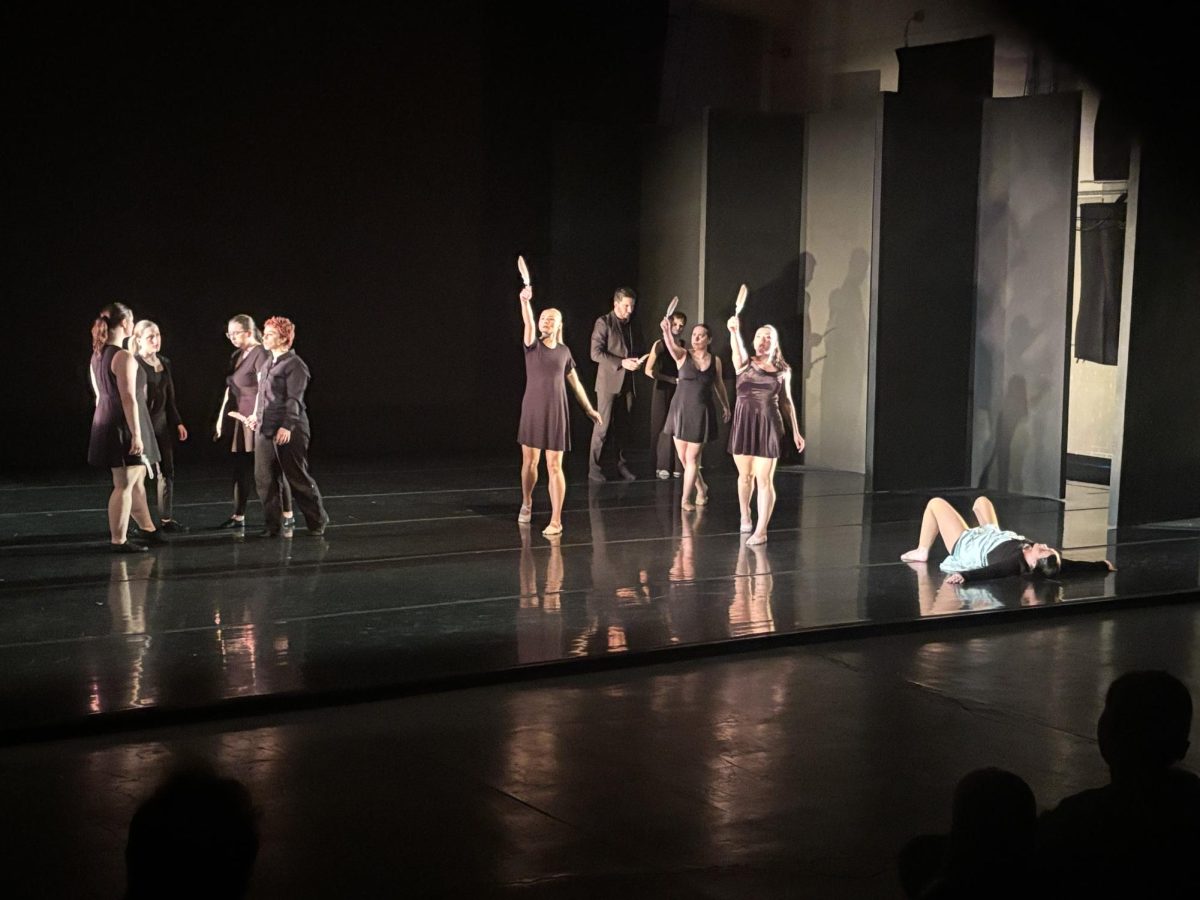By ANGELA MAURONI
Junior Editor
mauronia@allegheny.edu
On Nov. 14 through 17, the Playshop Theatre performed the Greek Tragedy by Euripides, “Medea.”
The play addressed sexism and the disregard of women’s emotions which was common in ancient Greece. It also addressed women’s general lack of power and fought that stereotype by using a strong female lead protagonist as well as her strong support, the Chorus.
“Women are inhibited by socially constructed ideas of gender,” said Maggie Boone, ‘14, who played Medea. She went on to say the Medea is an anomaly, breaking the norm of female compliance during the time period and taking action.
The play opens with a chorus member slowly walking on stage and holding out a bowl. When she slams the bowl on a table, the stage explodes in music and activity. The rest of the Chorus enters the stage as well, and they all dance to the angry music.
When it quiets and they leave the stage, the audience sees Nurse, Medea’s servant. She worries aloud about Medea, whose husband, Jason, has just left her for the princess. It is especially despicable to her because Medea abandoned her hometown and family s to save Jason and marry him in Greece. He has even left her despite the two sons they have together. Medea’s son’s tutor comes out, and she relays these worries to him.
The Chorus returns, and they play the part of the Corinthian women. They want the Nurse to bring out Medea, who is wailing from inside her home. Her pain is so intense that she curses her own existence and the lives of her children. She emerges when the Nurse goes to her, and laments her abandonment to the Corinthian women, who promise to never tell of her plots of revenge.
King Creon comes to her home then, telling her that she and her children are banished because he fears the revenge she may take on them. He is especially fearful because of her reputation for being intelligent, but after she gets on her knees and begs him, he allows her one more day.
Jason arrives upon Creon’s departure, and curses Medea for her public threats and outcries against the King. He claims that his remarriage is in everyone’s best interest because he is securing a stable future for Medea and their sons. Medea rejects this notion and any help he offers her.
Aegeus, King of Athens, arrives in Corinth by chance, and he offers her safe harbor in exchange for the promise of bearing him an heir.
With this assurance of a safe haven, Medea begins to enact her plans for revenge. She confides in the Chorus that she plans on poisoning Creon and the princess, and then killing her own children to make Jason suffer. Shocked, the Chorus tries to talk her out of killing the children, but she is sure that her grief at their loss will be outweighed by her satisfaction of revenge.
She sends for Jason to return, and while she waits for him she retrieves her best fabric, coating it and a crown in poison. When Jason arrives, she claims to have seen the error of her ways, and apologizes for her harsh words before. She points out that she is, after all, just a foolish woman. He accepts her apology, and she goes on to claim that the dress she made from the poisoned fabric and the crown are gifts for the princess to convince her to allow Medea’s two children to not be exiled, and instead be permitted to live in the palace with Jason. The children go with Jason to deliver the gifts, and shortly return.
After taking a long look at them, Medea breaks down crying, hugging a Chorus member and saying she would never think of killing them again. But she quickly gathers herself and changes her mind again, deciding that her revenge truly is the most important thing.
A servant of the King comes in then to warn Medea of how dearly she will pay, describing the horror of the Princess’s death. After putting on the gown, it began burning her, and the crown erupted in flames, both only growing tighter as she tried to remove them. After she died and her father was retrieved, he impulsively embraced her body and was also killed from the poisoned fabric. The servant curses Medea and then leaves.
The last part of her plan arrives, and with a heavy and determined heart, Medea ignores the Chorus’ pleading for her not to do it, and enters her home with a knife. We hear the children screaming, and then it is quiet. The Chorus members try to enter the house to stop her, but the doors are locked.
Then Jason arrives, fearing that one of the King’s family members will have sought out the murder of his children for revenge. The Corinthian women tell him his children are dead, and he starts beating at the door and screaming for Medea.
She appears on the roof, covered in blood and holding the body of one of their children. She tells him that all of it is his fault, and refuses to let him hold them one last time. The play ends with both characters despairing and in rage at each other.
Throughout this intense and gripping performance, the actors and actresses remained convincing in their roles. Some of the actresses playing the Corinthian women had tears on their faces when the children were killed.
Every grief-stricken cry Boone let out was moving and elicited heavy sympathy. At the same time, however, the audience could see her manipulation of the King and Jason, as well as her conflict over murdering her children.
“Finding the dynamic between the other characters,” Boone said. “That was the hardest part.”
Though Boone said she struggled, particularly with the scene where Medea decided against killing her children and then changed her mind again, deciding she needed to do it to satisfy her desire for revenge, the scenes where she jumped between her enraged, hurt, sorrowful, and repentant selves were the most gripping.






